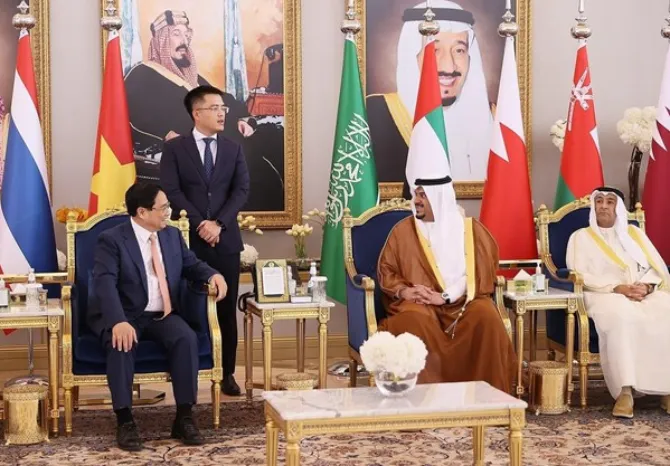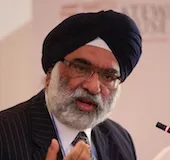-
CENTRES
Progammes & Centres
Location
The ASEAN GCC partnership is well-intentioned but needs improved cooperation and even interest across members on both sides.

The ASEAN-Gulf Cooperation Council (GCC) meeting on 20 October had a significance of its own. However, its timing became unique because despite the Hamas-Israel crisis, which drew the attention of the Gulf states, the GCC-ASEAN summit went through.
GCC is not a steadfast partner of ASEAN and has shown interest only in recent years. ASEAN too has its focus on developed countries as its dialogue and sectoral partners. It is only the United Arab Emirates (UAE) which is a sectoral partner of ASEAN, among the GCC countries. The fact that the GCC decided to have a summit with ASEAN was the manifestation of the peace that prevailed and extroverted economic and foreign policy that both were now ready to implement beyond their traditional partnerships. The GCC Troika met ASEAN at the United Nations General Assembly (UNGA) in 2018 and the foreign ministers met next year at UNGA too.
The ASEAN-GCC, rekindled partnership is a function of a peaceful West Asia. It has good plans as can be seen from the joint communique. Their pursuit will depend on the continuing prevalence of peace in the region, which is currently under threat. It is proposed to hold it biannually, with the next one scheduled in Malaysia in 2025.
ASEAN has three broad objectives, many of them led by individual ASEAN countries, which have relationships with individual GCC countries. For several of them, the diaspora and remittances are important. Indonesia and the Philippines, in particular, have a large diaspora among the Gulf countries and receive large remittances; their welfare is an important issue. For Indonesia, Malaysia, and Brunei, the main Muslim countries in ASEAN, the Hajj quotas are another important issue with Saudi Arabia and not with the Gulf as a whole.
With the Gulf countries, ASEAN countries desire to have economic cooperation, particularly via foreign direct investments (FDI) and oil and gas engagement. The ASEAN countries are important recipients of FDI and foreign-funded infrastructure projects, particularly from China under the Belt and Road Initiative (BRI). In their diversification, the Gulf countries play a bigger role. Saudi Arabia and the UAE, in particular, have looked at individual ASEAN countries but the substantive progress has not been commensurate with discussions
For the Gulf states, the main objective is to have a stable relationship with a region where economic development is growing. Since the GCC has a robust relationship with India, the desire to enhance the Indo-Pacific approach means that engaging ASEAN is also important.
Diversification of GCC policies signifies their desire to enhance the relationship with ASEAN. Individual GCC countries and individual ASEAN member states have signed Comprehensive Economic Partnership agreements. A possible free trade agreement between the two regional organisations is also feasible.
ASEAN wants GCC countries to participate in projects under the ASEAN Connectivity 2025 rubric, which was announced at the G20 Summit in India in September. This is another specific project which could have ASEAN linkages. PM Modi before the announcement of the India-Middle East-Europe-Economic Corridor (IMEC) spoke about such connectivity with the Middle East and Europe extending to ASEAN countries at the India ASEAN summit in Jakarta on 7 September 2023. Therefore, the discussions with the GCC are complementary to what India seeks. Is ASEAN viewing their partnership with GCC independently or with India in the mix? So far, ASEAN has always treated India as a separate partnership and worked with other partners independently even in the Global South. To build on PM Modi's suggestion at the India-ASEAN Summit, ASEAN would do well to have a regional connectivity project with the Gulf countries which includes India. This seems to be the Gulf states perspective as well. ASEAN, seems keener to get GCC investment into ASEAN connectivity projects within their own countries, like the BRI has done.
Both the GCC and ASEAN believe that they are central to their regions and now the two regions should connect. For ASEAN connectivity, a pre-summit meeting between business, academia, and media people from GCC and ASEAN was held in Saudi Arabia. They agreed that even at the Track 2 level, the essential element was to move strategically and have more private business sectors look at each other. The Federation of Gulf Chamber and an ASEAN entity are likely to sign a Memorandum of Understanding (MoU). A follow-up meeting is expected in January 2024.
The Gulf with the Strait of Hormuz and ASEAN with the Strait of Malacca are considered strategic outposts in Asia. Can they enhance their attention to each other? And keep this attention span from wavering? After all, GCC and ASEAN have had relations since 1990. Certainly, both GCC and ASEAN are growing rapidly, and therefore, more cooperation seems the logical step. Both count similar partners backing each other, like the United States (US) India, Japan, and South Korea. Yet it is unclear whether they will work with those partners or simply use the familiarity with those partners to seek more Gulf investment into ASEAN
GCC and ASEAN were founded within five years of each other. ASEAN was founded in 1976 with five members—now 10. The GCC was founded in 1981 and has Bahrain, Kuwait, Oman, Qatar, Saudi Arabia and the UAE. Compared to the discordant noises within the GCC, perhaps ASEAN unity looks less challenging. Both are committed to the centrality of their organisations in their regions. ASEAN has no real dominant power. The GCC is largely the handiwork of what the UAE and Saudi Arabia do, with Bahrain and Qatar often providing the odd man out. Now that both the groups are trying to go beyond the bilateral relations, they intend to support each other’s centrality and perhaps create a strategic arena where new partnerships among their members could develop.
For this, they have the first-ever framework of cooperation from 2024 to 2028, which if implemented, would lead to better engagement. What remains to be seen is how this will be funded. Though GCC and ASEAN are seeking South-South cooperation, ASEAN finds it difficult to differentiate between its developed and developing partners and always expects all partners to fund all the activity with them. The salient point of this framework of cooperation is that it goes beyond what some countries have bilaterally been doing, which are economic and religion-based exchanges. Now, counterterrorism, radicalisation climate change, renewable energy and food security are important issues, which they intend to cover.
The GCC-ASEAN bilateral trade was about US$110 billion in 2022. It makes the GCC countries an important partner of ASEAN behind China, India and the European Union (EU). However, analysts believe that with a combined GDP of about US$5.5 trillion, the GCC and ASEAN could trade much more.
ASEAN-GCC trade was US$78 billion in 2010, rising to US$85 billion in 2021, and then rapidly going to US$110 billion in 2022. GCC investment in ASEAN is about US$13.4 billion between 2016 and 2021. Most of it comes from the UAE and goes mainly to Indonesia, Malaysia, and Singapore. The point of a GCC-ASEAN partnership is to achieve a more even relationship where every member plays a role. Singapore and the GCC already have an FTA enforced in 2013. It led to a trade of US$43 billion from 2014-2021. Will other ASEAN countries sign individual FTAs with the GCC, or will ASEAN and GCC have a trade arrangement?
From the GCC, the main export good is crude oil while ASEAN mainly exports electronics and machinery. Indonesia and Malaysia expect to corner more of the halal market in the GCC countries and are starting the harmonisation of certification processes for halal standards. Singapore as a financial hub is looking at more engagement with Dubai, Abu Dhabi, Manama, and Riyadh. While there has been talk of reliable oil supply and an interest in energy transition, the fact that the GCC countries are heavily focused on oil, their commitment to renewable energy is low. The COP28 Summit that is being hosted by the UAE will perhaps show this. ASEAN is keen that GCC countries should invest in the regional power grid that they plan to establish.
The initial discussion between GCC and ASEAN focused on peace as the basis for a prosperous region. ASEAN holds up the Treaty of Amity and Cooperation (TAC) as the model for this. In July 2023, Saudi Arabia acceded to the TAC and now all GCC countries are TAC adherents. This gives them a common platform. The reemergence of the Israel-Hamas crisis has again shown differences both within the GCC and ASEAN. Indonesia, as the ASEAN chair, and Malaysia as the current coordinator of ASEAN-GCC partnership, ensured that the summit succeeded despite the times and were instrumental in ensuring that there was an ASEAN Foreign Minister statement and a joint statement with the GCC on Gaza. While not earth-shattering, these showed some common views on the importance of humanitarian law and action, civil protection, and a two-state solution.
ASEAN countries have been taking their own positions on this. The Philippines, for instance, is closely allied to the US and recognises Israel's right of self-defence; Singapore condemned Hamas; Indonesia and Malaysia are more aligned with Palestine and do not have relations with Israel. The other six ASEAN countries have been a little distant in their comments. This varying stance leads to a weak ASEAN-GCC statement.
At the UNGA vote on 27 October 2023, calling for an immediate humanitarian truce and aid access to Gaza, 120 countries voted in favour, 14 were against and 45 abstained. All the GCC countries voted for the resolution. ASEAN countries had some diversity; Brunei, Indonesia, Laos, Malaysia, Myanmar, Singapore, Thailand, Vietnam, and even Timor Leste voted for the resolution. The Philippines voted against the resolution and Cambodia was absent.
The ASEAN GCC partnership is well-intentioned but needs improved cooperation and even interest across members on both sides. It is led by a few countries who will see how to maximise gain with or without ASEAN-linked partnerships. The strategic evolution of both regions is a challenge to them presently.
Gurjit Singh is India’s former ambassador to Germany, Indonesia, Ethiopia, ASEAN and the African Union.
The views expressed above belong to the author(s). ORF research and analyses now available on Telegram! Click here to access our curated content — blogs, longforms and interviews.

Gurjit Singh has served as Indias ambassador to Germany Indonesia Ethiopia ASEAN and the African Union. He is the Chair of CII Task Force on ...
Read More +